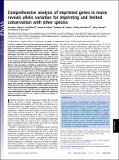Comprehensive analysis of imprinted genes in maize reveals allelic variation for imprinting and limited conservation with other species
Author(s)
Waters, Amanda J.; Bilinski, Paul; Eichten, Steven R.; Vaughn, Matthew W.; Ross-Ibarra, Jeffrey; Gehring, Mary; Springer, Nathan M.; ... Show more Show less
DownloadWaters-2013-Comprehensive analys.pdf (947.9Kb)
PUBLISHER_POLICY
Publisher Policy
Article is made available in accordance with the publisher's policy and may be subject to US copyright law. Please refer to the publisher's site for terms of use.
Terms of use
Metadata
Show full item recordAbstract
In plants, a subset of genes exhibit imprinting in endosperm tissue such that expression is primarily from the maternal or paternal allele. Imprinting may arise as a consequence of mechanisms for silencing of transposons during reproduction, and in some cases imprinted expression of particular genes may provide a selective advantage such that it is conserved across species. Separate mechanisms for the origin of imprinted expression patterns and maintenance of these patterns may result in substantial variation in the targets of imprinting in different species. Here we present deep sequencing of RNAs isolated from reciprocal crosses of four diverse maize genotypes, providing a comprehensive analysis that allows evaluation of imprinting at more than 95% of endosperm-expressed genes. We find that over 500 genes exhibit statistically significant parent-of-origin effects in maize endosperm tissue, but focused our analyses on a subset of these genes that had >90% expression from the maternal allele (69 genes) or from the paternal allele (108 genes) in at least one reciprocal cross. Over 10% of imprinted genes show evidence of allelic variation for imprinting. A comparison of imprinting in maize and rice reveals that 13% of genes with syntenic orthologs in both species exhibit conserved imprinting. Genes that exhibit conserved imprinting between maize and rice have elevated nonsynonymous to synonymous substitution ratios compared with other imprinted genes, suggesting a history of more rapid evolution. Together, these data suggest that imprinting only has functional relevance at a subset of loci that currently exhibit imprinting in maize.
Date issued
2013-11Department
Massachusetts Institute of Technology. Department of Biology; Whitehead Institute for Biomedical ResearchJournal
Proceedings of the National Academy of Sciences
Publisher
National Academy of Sciences (U.S.)
Citation
Waters, A. J., P. Bilinski, S. R. Eichten, M. W. Vaughn, J. Ross-Ibarra, M. Gehring, and N. M. Springer. “Comprehensive Analysis of Imprinted Genes in Maize Reveals Allelic Variation for Imprinting and Limited Conservation with Other Species.” Proceedings of the National Academy of Sciences 110, no. 48 (November 11, 2013): 19639–19644.
Version: Final published version
ISSN
0027-8424
1091-6490